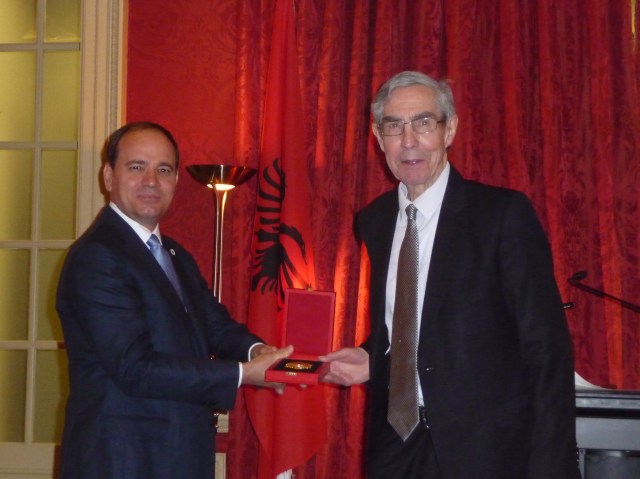 Skanderbeg is the Albanian national hero. He kept the invading Ottomans at bay for 20 years in the middle of the fifteenth century, and his home town of Cruja, half way up the mountains, boasts a fine museum in his honour. His equestrian statue, sword uplifted, dominates the main square in Tirana.
Skanderbeg is the Albanian national hero. He kept the invading Ottomans at bay for 20 years in the middle of the fifteenth century, and his home town of Cruja, half way up the mountains, boasts a fine museum in his honour. His equestrian statue, sword uplifted, dominates the main square in Tirana.
Legend has it that Skanderbeg
“never slept more than five hours at night and could cut two men asunder with a single stroke of his scimitar, cut through iron helmets, kill a wild boar with a single stroke, and cleave the head of a buffalo with another.”
Today I received the insignia of appointment as a Knight of the Order of Skanderbeg from the President of Albania at a ceremony at the RAC Club in Pall Mall today. The English version of the citation reads:
“In recognition of his tireless and years long [sic] work in the legal field, and as a token of appreciation and gratitude to the precious and unsparing help provided continuously to improve the judicial system of Albania.”
My travelling days are now over, but between February 2010 and March 2016 I visited Albania at least 18 times. It is a young country with many fine (and hospitable) people who are determined to do all they can to put the past behind them in a land where corruption has been endemic. I have had excellent working relationships with successive Ministers of Justice, two Chief Justices, successive heads of the judges’ excellent training school and the Chairman of the Albanian Bar – and many others.
And I have brought many leading English legal and judicial figures out to Albania (including Mark Potter, David Keene, Konrad Schiemann and David Latham from my former colleagues in the Court of Appeal) to assist with the work the Slynn Foundation has been doing there. More recently Stanley Burnton, Nicholas Phillips and Christopher Vajda (the British judge at the CJEU in Luxembourg) have joined in the work we are doing there. .
Sadly in England we often hear only about the dark side of Albania. There is a much brighter side, especially among the young. There is now a rearguard action being fought by diehards against the implementation of much needed reforms to the justice system which ought to give Albania a better future, but in my view, if Albania continues to receive the wise and experienced external support it deserves, that future should be reasonably bright, if measured over decades rather than single years.
Incidentally, after publicity was given to a recent decision by the UK Supreme Court which put a proposed extradition on hold while a lower court examined whether systemic corruption in the Albanian justice system was such that the appellant would not receive a fair trial in the criminal court in which he would face trial, a court in Glasgow heard evidence on both sides (including the testimony of a very fine Albanian civil servant whom I often met when I was out there) and ruled that the extradition should go forward.
In our present unhappy political climate some people speak carelessly of our leaving the Council of Europe – as well as the European Union – as victories to be won if we are to re-establish so-called control of our affairs. From my experience in Eastern Europe – and not only in Albania – it would be nothing short of tragic if we were to do so because it gives us a means of proselytising about the rule of law and the independence of the judiciary in a manner which would lack conviction if we were to slam the door on the Council of Europe, too.
I met the President of Albania three times in his previous incarnation as Minister of Justice. He presided charmingly at today’s ceremony, at which four others received Albanian honours, in addition to myself. His presence in London spoke volumes for the present condition of Anglo-Albanian friendship.
